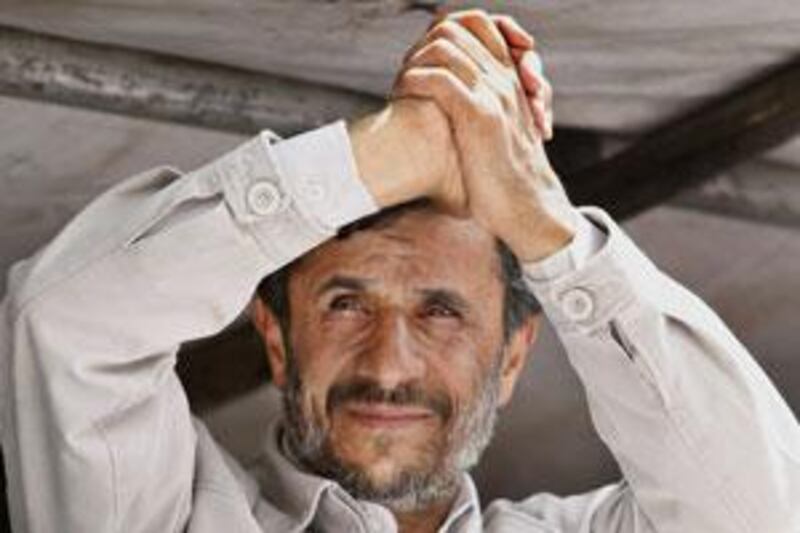TEHRAN // The hardline Iranian president Mahmoud Ahmadinejad today won the country's election by a thumping margin, according to official results which his moderate challenger rejected as a "dangerous charade" that could lead to tyranny. Mr Ahmadinejad has won 63 per cent of the vote in most electoral districts across Iran, the election chief Kamran Daneshjoo said, meaning the incumbent hardliner is assured of victory. Kamran Daneshjoo said on state television that Mr Ahmadinejad received almost 21.8 million votes or 63.36 per cent out of nearly 34.4 million valid votes cast in 346 out of 366 electoral districts across the country. He said Mr Ahmadinejad's closes rival, the more moderate ex-premier Mir Hossein Mousavi, garnered 11.7 million votes or 34.07 per cent.
In a distant third was the former head of the Revolutionary Guards Mohsen Rezai with almost 588,000 votes or 1.7 per cent while reformist ex-parliament speaker Mehdi Karroubi received almost 290,000 votes or 0.87 per cent. The level of the incumbent's support, nearly twice as many votes as former Prime Minister Mirhossein Mousavi with most ballots counted from Friday's poll, confounded widespread expectations that the race would at least go to a second round. Mr Mousavi protested against what he said were many obvious violations in Friday's presidential election. He warned he would not bow to the "dangerous scenario" created in Iran after results showed he had lost to Mr Ahmadinejad. Mr Mousavi said he "protested vigorously against the numerous and blatant irregularities" in Friday's vote and said it was his "national and religious duty to reveal the secrets of this dangerous process and to explain its destructive consequences for the future of the country". "I'm warning I will not surrender to this dangerous charade. The result of such performance by some officials will jeopardise the pillars of the Islamic Republic and will establish tyranny," he said in a statement.
Iranian and Western analysts abroad greeted the results with disbelief. They said Mr Ahmadinejad's re-election would disappoint Western powers aiming to convince Iran to halt work they suspect is aimed at making bombs, and could further complicate efforts by the US president Barack Obama to reach out to Tehran. "It doesn't augur well for an early and peaceful settlement of the nuclear dispute," said Mark Fitzpatrick at London's International Institute for Strategic Studies. A bitterly fought campaign generated strong interest around the world and intense excitement inside Iran. It revealed deep divisions among establishment figures between those backing Mr Ahmadinejad and those pushing for social and political change. Mr Ahmadinejad accused his rivals of undermining the Islamic Republic by advocating detente with the West. Mr Mousavi accused him of humiliating Iranians with an "extremist" foreign policy.
Listing several complaints before official results were announced, Mr Mousavi said late on Friday that many people had not been able to vote and that there was a lack of ballot papers. He also accused authorities of blocking text messaging, with which his campaign tried to reach young, urban voters. "I am the definite winner of this presidential election," Mr Mousavi told a news conference. Trita Parsee, the president of the Washington-based National Iranian American Council, expressed disbelief at the wide margin in Mr Ahmadinejad's favour. "It is difficult to feel comfortable that this occurred without any cheating," Mr Parsee said. "The potential for unrest is high," said Ali Ansari, who heads the Institute for Iranian Studies at St Andrews University in Scotland. "People will wake up today in Iran in shock." *Agencies





